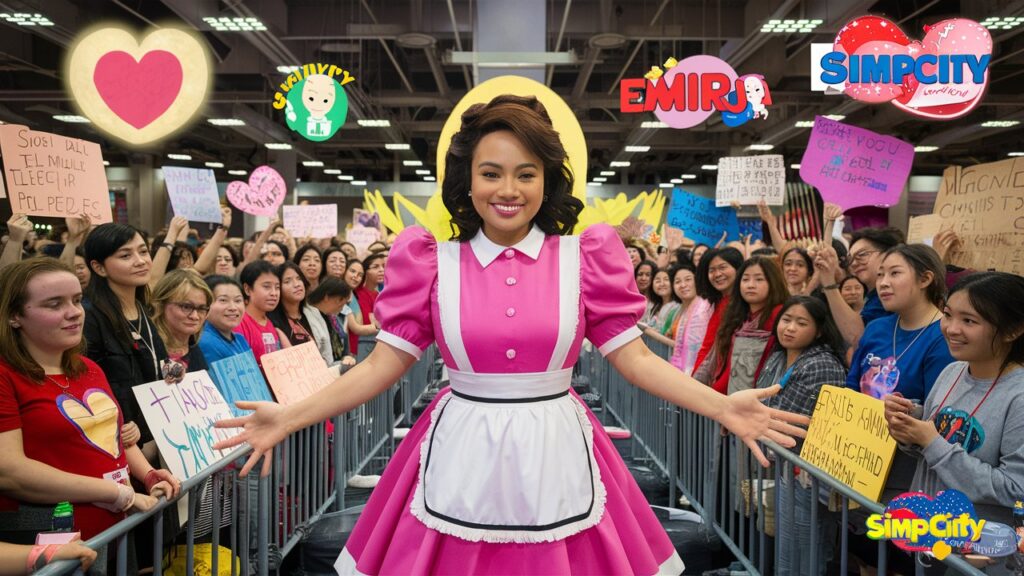Introduction
The rise of online content creators has reshaped how fans interact with their favorite personalities. Among these creators, Emiru—a popular Twitch streamer and cosplayer—has cultivated a unique fanbase known colloquially as “Simpcity.” This term, blending “simp” (a slang term for someone overly devoted to a creator) and “city” (symbolizing a community), reflects the intense loyalty and engagement of her supporters. But what drives this phenomenon? How does it impact both the creator and the audience? In this article, we delve into the world of Emiru and Simpcity, analyzing its origins, cultural significance, and implications for modern fandom.
1. Who Is Emiru? The Rising Star of Twitch and Cosplay
Emiru, born Emily Schunk, is a multifaceted content creator known for her charismatic Twitch streams, elaborate cosplays, and collaborations with top creators like Mizkif and OTK (One True King). Starting her career in 2018, she quickly gained traction for her gaming content, humor, and creative costumes, which range from anime characters to pop culture icons. Her authenticity and relatability have endeared her to millions, making her one of Twitch’s fastest-growing female streamers. Beyond streaming, Emiru’s YouTube channel showcases her cosplay tutorials and vlogs, further solidifying her influence in the gaming and cosplay communities.
2. The Birth of “Simpcity”: How Emiru’s Fanbase Earned Its Name
The term “Simpcity” emerged organically from Emiru’s community. Fans began jokingly referring to themselves as “simps”—a term originally used to mock overly eager supporters—as a badge of honor. Over time, this self-deprecating humor evolved into a collective identity. Simpcity represents more than just admiration; it embodies a culture of lighthearted devotion, where fans celebrate Emiru’s content through fan art, memes, and financial support (e.g., donations, subscriptions). This phenomenon isn’t unique to Emiru, but her community’s embrace of the label has turned Simpcity into a recognizable subculture within Twitch.
3. The Psychology Behind Simpcity: Why Fans Gravitate Toward Emiru
The allure of Simpcity lies in a combination of factors. Emiru’s approachable personality fosters a sense of intimacy, allowing fans to feel connected despite the parasocial nature of online interactions. Her transparency about her life, struggles, and creative process humanizes her, creating emotional investment. Additionally, the cosplay aspect taps into niche fandoms, attracting anime and gaming enthusiasts. Psychologically, the “simp” dynamic allows fans to channel their admiration into a shared identity, blending humor with genuine support. This duality helps mitigate the stigma of being a “simp,” transforming it into a communal experience.
4. Simpcity’s Role in Emiru’s Career Growth
Simpcity has played a pivotal role in Emiru’s success. The community’s active engagement—through Twitch chats, social media trends, and financial contributions—has amplified her visibility. For instance, her 2021 collaboration with OTK introduced her to broader audiences, while Simpcity’s enthusiastic response cemented her position in the streaming world. However, this dynamic also raises questions about dependency. While fan support provides stability, creators like Emiru must balance authenticity with the pressures of maintaining their audience’s loyalty.

5. Simpcity and the Broader Impact on Online Communities
Emiru’s Simpcity is a microcosm of larger trends in digital fandom. Platforms like Twitch and TikTok thrive on hyper-engaged communities, where inside jokes and shared identities fuel content virality. However, this culture also risks fostering toxicity, as excessive devotion can blur boundaries between creators and fans. Simpcity, however, has largely avoided this pitfall by maintaining a self-aware, humorous tone. Its success offers insights into how modern fandoms can cultivate positivity while navigating the pitfalls of online obsession.
6. Addressing Controversies: Is Simpcity Problematic?
Critics argue that terms like “simp” perpetuate unhealthy dynamics, normalizing obsessive behavior or financial exploitation. In Emiru’s case, however, Simpcity operates with mutual respect. She frequently acknowledges her fans’ support while setting clear boundaries, discouraging invasive behavior. Moreover, the community’s emphasis on humor and camaraderie distinguishes it from toxic fandoms. That said, the line between playful devotion and genuine obsession remains thin, highlighting the need for creators to model healthy fan interactions.
Conclusion: The Future of Simpcity and Digital Fandom
Emiru’s Simpcity exemplifies the evolving relationship between creators and audiences in the digital age. It showcases how humor, shared identity, and mutual respect can transform a potentially derogatory term into a thriving community. As online spaces grow more interconnected, the lessons from Simpcity—balancing engagement with boundaries, fostering positivity without toxicity—will shape the future of fandom. For Emiru and her supporters, the journey is a testament to the power of authenticity in building lasting connections.
Frequently Asked Questions (FAQs)
Q1: What does “Simpcity” mean?
A1: Simpcity is a portmanteau of “simp” and “city,” referring to Emiru’s dedicated fanbase. The term humorously acknowledges fans’ enthusiastic support while fostering a sense of community.
Q2: How does Emiru feel about her “Simpcity” fans?
A2: Emiru has expressed gratitude for her fans’ support and often engages with them lightheartedly. She emphasizes mutual respect and discourages overly intrusive behavior.
Q3: Is being a “simp” inherently negative?
A3: While “simp” originated as a derogatory term, communities like Simpcity have reclaimed it as a playful, self-aware label. Context and intent determine whether it’s harmful or humorous.
Q4: How can fans support creators without crossing boundaries?
A4: Respect creators’ privacy, avoid excessive financial pressure, and engage positively. Healthy fandom balances admiration with acknowledging creators’ autonomy.
Q5: Could Simpcity’s model work for other creators?
A5: Yes! Communities thrive on authenticity and shared identity. However, success depends on a creator’s ability to foster respect and maintain boundaries.
This deep dive into Emiru and Simpcity reveals how modern fandom blends humor, devotion, and digital culture—a dynamic worth watching as online communities continue to evolve.
